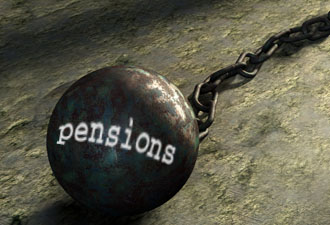Media
Union Leaders Misrepresent Pension Reforms
 CF Senior Fellow Rick Dreyfuss testified yesterday before the Pennsylvania House about how to make our public pensions current, affordable and predictable, proposing a five-step plan for doing so. Lasting comprehensive reform is urgent because taxpayers face ballooning costs, with their contributions set to rise from $1.7 billion in 2012 to $6.1 billion by 2017. That’s more than $1,000 in additional taxpayer costs per household.
CF Senior Fellow Rick Dreyfuss testified yesterday before the Pennsylvania House about how to make our public pensions current, affordable and predictable, proposing a five-step plan for doing so. Lasting comprehensive reform is urgent because taxpayers face ballooning costs, with their contributions set to rise from $1.7 billion in 2012 to $6.1 billion by 2017. That’s more than $1,000 in additional taxpayer costs per household.
The unfunded liability for the two main government worker pension systems, the Public School Employee Retirement System (PSERS) and the State Employee Retirement System (SERS), currently exceeds $40 billion.
How did things get so bad? For starters, politicians promised workers pension benefits that are unaffordable and unsustainable. When the economy and pension funds were doing well, lawmakers increased benefits for workers and retirees.
But when the economy and investments went south, lawmakers pushed off payments into the funds, at a great cost to taxpayers. Act 40 of 2003 and Act 120 of 2010 delayed taxpayer contributions into the pension systems, resulting in higher future pension payments. Over the next few years, projected pension payments will rise to nearly 30 percent of payroll—and stay at that level for more than 20 years.
In response to the pension reform hearings yesterday, the Pennsylvania State Education Association criticized politicians for delaying pension payments, noting school employees “never stopped paying their 7.5 percent of salary toward their pensions, even when the Commonwealth was not making adequate payments over the last 12 years.” It’s interesting the PSEA should pillory politicians now, considering the teachers union not only lobbied heavily to have pension payments delayed, but denied there was any looming pension crisis.
Even worse than the PSEA’s feigned innocence was the response of the Pennsylvania AFL-CIO, which misquoted and mischaracterized Dreyfuss’ comments:
Richard C. Dreyfuss of the Commonwealth Foundation admitted that the switch from a defined benefit plan to a defined contribution plan would cause the unfunded liability to increase. When asked about the increase to taxpayers he agreed that the cost would be an additional $2 billion to the State’s General Fund and an additional $2 billion to school districts across Pennsylvania, “per year as far out as we can see.”
The truth is, as Rick made clear in testimony, that pension plans’ unfunded pension liabilities are the same regardless of any change in the type of retirement plan offered for new employees. We can’t take away the benefits already promised to government workers, but we can prevent a future pension crisis.
Unions such as the AFL-CIO are fighting long-term reforms that would make pensions affordable for future taxpayers and ensure we keep our promises to government workers when they retire. It’s high time they recognized how deep our pension crisis is—and admit their role in creating it.